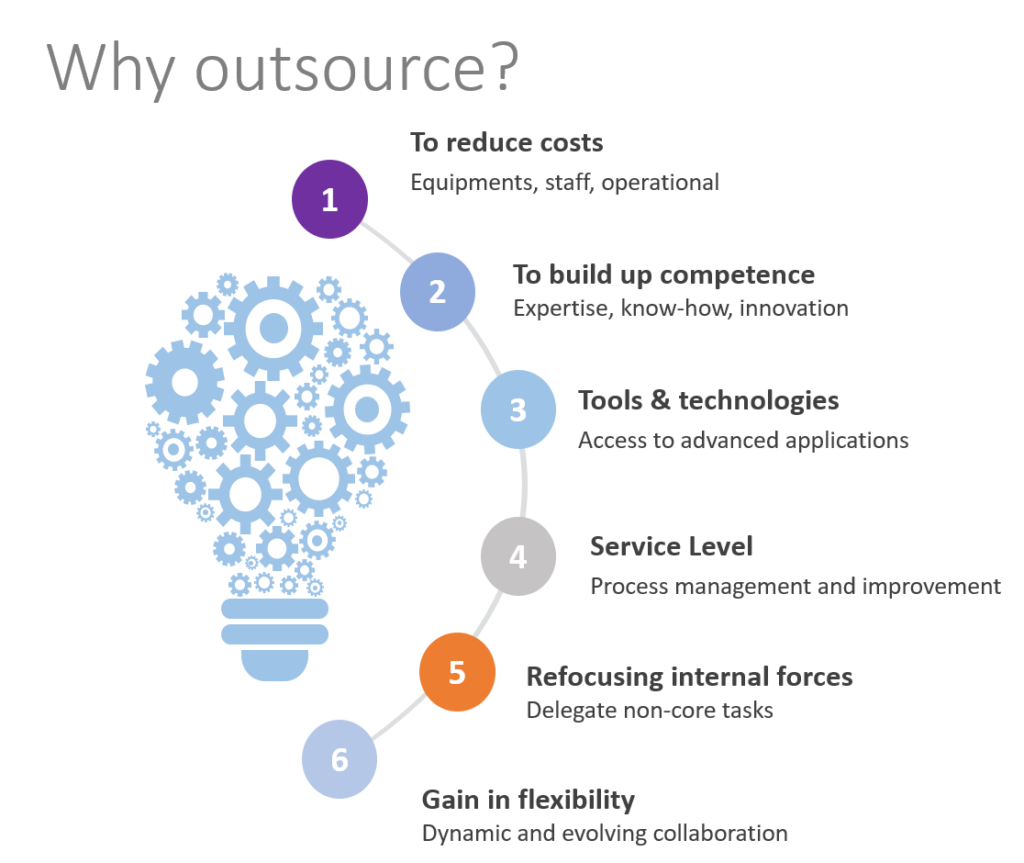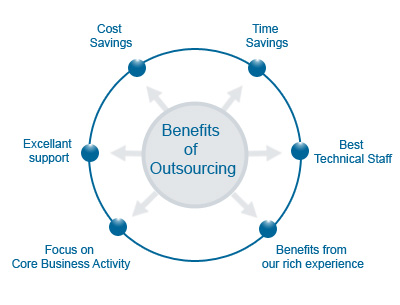Welcome to our exploration of the “Future of Outsourcing.” In this blog, we embark on a journey through the evolving landscape of outsourcing and the compelling trends and innovations that will redefine this practice in the years to come. As we enter a new era of digitalization, automation, and global connectivity, outsourcing is poised to play a pivotal role in shaping the way businesses operate and succeed.
In terms of business, what makes more sense is:
Is it better to do it in-house or outsource it?
Many business decision-makers are facing this question these days. Since you’re here seeking outsourcing examples, maybe you’re one of them.
This post explains what common tasks companies outsource and the benefits they receive.
What is outsourcing?
The practice of outsourcing involves hiring an outside company or individual contractor to perform tasks and projects that were previously handled in-house. To reduce costs and fill talent gaps, companies outsource. Outsourcing can also improve efficiency and allow companies to focus on their core competencies. Companies can outsource tasks such as accounting, software development, and customer support.
A company can outsource services onshore (within its own country), nearshore (to a neighbouring country), or offshore (to countries located in different time zones). One of the most cost-effective arrangements is offshore outsourcing.
Outsourcing basics:
- Transfer of certain scopes of work
- Long-term cooperation requires a contract of at least one year.
- Outsourcing can only be used for secondary functions
- Relegating some business processes
The best examples of outsourcing are advertising, office and warehouse cleaning, and web development. Most business owners delegate responsibility for bookkeeping, maintenance, and recruitment to outsourced specialists. By doing this, enterprises are able to focus most of their resources on their main activities.
Future of Outsourcing: What’s Next?
As the “great resignation” surges forward, remote and hybrid workplaces become increasingly popular, and automation takes hold with improved technologies, the outsourcing industry is likely to continue to grow.

Globally, outsourcing spending is expected to reach $731 billion in 2023. It is expected that IT outsourcing expenditures will increase by 22% over 2019’s numbers in order to reach $519 billion by 2023. The global business process outsourcing market could grow by 19% over 2019’s figures to reach $212 billion in 2023. It is predicted that the industry of business process outsourcing will reach $525 billion by 2030, according to Grandview Research.
Future of Outsourcing Pros And Cons

Depending on a variety of factors, outsourcing can have both benefits and drawbacks. Improved productivity, cost savings, time savings, and better resource utilization are the primary benefits. Businesses can also tap into vast reservoirs of expertise outside of their industry by outsourcing non-core functions. As a result of outsourcing, fewer positions need to be filled in-house, which eases the hiring process.
Outsourcing can cause problems when businesses choose partners who are not high-quality. Outsourcing has disadvantages such as lack of continuity of communication, quality issues, security concerns, and hidden fees. The business can also suffer if you don’t receive the quality of service you expected.
Outsourcing Examples
- IT services
- Customer service
- Accounting
- Legal services
- HR (talent acquisition)
- Manufacturing
- Logistics
- Marketing
- Cleaning services
- Business development and sales
1. IT Services
IT outsourcing refers to the process of outsourcing a part of an organization’s IT-related activities to a third party in order to save money. Basically, this means having others take care of these tasks while fully controlling the entire process.
Outsourcing IT tasks are most commonly used for:
- Development of websites
- Application development
- Tasks related to cybersecurity
- Support and maintenance
- Infrastructure for IT
IT outsourcing is easy to get started with. Look for a software development outsourcing company (review platforms like Clutch are great places to find them), read reviews, and contact them.
Our own company, Asktech, is also an outsourcer of web and mobile software development.
There are many examples of outsourcing in IT:
- Cybersecurity tasks are outsourced by Starbucks
- Third-party vendors design Slack’s apps
- For iOS app development, WhatsApp hires outside contractors
Even though the companies on this list are quite large, IT outsourcing is affordable for small businesses. This business strategy aims to get high-quality work for a lower price.
2. Customer service
Companies outsource customer service to help them with answering calls, live chats, emails, or social media messages.
External support providers offer the following benefits:
- Availability. To ensure that your business is more accessible to customers, you can hire support agents in your choice of time zones
- Flexibility. With more support agents, a company can handle more service requests and even provide assistance after hours
- Professionalism. Customer support agents from all over the world are highly trained and experienced
It’s also affordable for most businesses to outsource customer service.
3. Accounting
Accounting outsourcing involves transferring an organization’s functions and bookkeeping. Business processes are most complicated on the financial side.
Partnerships between enterprises and outsourcers are based on the volume and nature of services required. Managing several business processes at once is the goal. This field requires knowledge and experience from the leader.
In order to transfer these functions to a third-party company, small firms need accounting services that are easily and narrowly focused. The cost of installing and updating accounting software, staff salaries, and taxes can be reduced. Outsourcing accounting services to a specialist can help reduce the financial burden on small businesses, allowing them to focus on their core operations and growth. Additionally, fasten your seatbelts as we navigate through the exciting and transformative realm of the “Future of Outsourcing.”
4. Legal services
Legal outsourcing involves the use of both local and foreign lawyers and law professionals for tasks such as document reviews, legal compliance, and non-substantive court appearances.
Various aspects of business legal support are outsourced by law offices. In addition to providing legal support in court, they can assist you with labour, corporate, and tax law. Foreign economic activity and exchange regulation can be handled by international law firms.
This can include helping with the registration of a foreign legal entity, opening foreign accounts, and obtaining licenses or other documents for foreign economic activity. International law firms also help with setting up international trade contracts and resolving disputes. They can also help with contract law and intellectual property protection. They can provide advice on international treaties and agreements. Finally, they can help you navigate local laws and regulations.
5. HR (Talent Acquisition)
Outsourcing of HR or talent acquisition occurs when a company hires an outside contractor to handle some or all of its HR processes. Recruiting, payroll processing, employee perks management, and more are some of those processes.
Take talent acquisition as an example.
An external HR professional will handle the following:
- Posting and creating job ads
- The process of finding qualified candidates online
- Interviewing candidates and contacting them
- Interviewing with HR professionals in-house
In addition to networking, HR outsourcing (Future of Outsourcing)companies often find qualified candidates quickly. The result is that companies save tons of time and get the employees they need. In this way, the company is able to hire the best talent quickly, without having to wait weeks or months. They can also rest assured that the person they hire is qualified for the job.
Outsourcing can also help to reduce costs associated with hiring, such as advertising, interviewing, and background checks. It also helps to ensure that the company has the right people in the right roles, with the right skills, and in the right place. Outsourcing HR services also helps to reduce costs for the company, as they don’t have to bear the burden of recruitment Furthermore, companies can be sure of the quality of the candidate they hire, as the outsourced company is likely to have a deeper understanding of the job requirements.
6. Manufacturing
Large companies with large production capacities frequently use this type of outsourcing. Global automotive brands, for instance, successfully transfer various functions to highly specialized companies.
Future of Outsourcing, an enterprise can focus most of its resources on creating and improving quality products and services. Due to the introduction of new technologies, changes in priorities in the sales market, and extreme competition, it is vital.
Outsourcing production also allows enterprises to access the newest technologies and skills which may not be available in-house. Additionally, it can help to reduce costs and increase efficiency, allowing the enterprise to remain competitive in the market.
One of the biggest fashion retailers in the world, H&M, is an example of an organization that outsources manufacturing. In more than 50 countries, the company rents its production facilities.
7. Logistics
In years past, enterprises had to invest a lot of money in preparing and maintaining large staffs responsible for coordinating transportation and warehouse operations. Transport departments are no longer necessary. Getting in touch with a logistics company is all it takes.
This is something many people choose to do. Global logistics outsourcing is now worth $986 billion, which is the best proof.
Logistics outsourcing companies can deliver your goods anywhere in the world. Railway, car, ship, and air logistics are all available to you. Most transport operations are delegated to other companies in this type of outsourcing. Business process management is simplified and costs are reduced significantly.
It is possible for logistics companies to provide both transportation and stock storage services. Renting warehouses and worrying about product safety are no longer necessary.
It is important to pay attention to a logistics operator’s reviews, their service prices, and their execution rate when choosing one. Customers and logistics companies interact efficiently when many factors are taken into account. It is important to take into account the product features, the amount of freight traffic, and the frequency of delivery.
8. Marketing
Outsourcing marketing involves hiring third-party employees or agencies to carry out or oversee marketing activities. Businesses will always want to market themselves professionally and uniquely, which is why marketing is one of the most common examples of outsourcing.
Outsourced marketing activities include:
- Content writing
- Managing social media accounts
- Creating advertising campaigns
- Carrying out market research
- Doing email marketing
- Making the entire marketing strategy
- Influencer marketing
By outsourcing email marketing, for example, companies can ensure that their emails are consistent, relevant, personalized, and compliant with spam laws. This leads future of outsourcing to good customer relationships and sales.
Outsourcing email marketing also reduces the company’s overhead costs, improves efficiency, and helps to create better customer experiences. Additionally, it allows the company to focus more of its resources on other important tasks.
9. Business Development & Sales
Business development and sales are important, so why outsource them? Business owners often struggle to keep their companies moving forward (and their sales pipelines full) with so many projects on their plates.
Outsourcing sales involves the following:
Building your sales pipeline faster makes sense when you make this decision. Consider hiring a highly trained professional to reach more clients or reach new markets with your product.
Lead generation, market research, and contacting and meeting with clients are also included in outsourcing sales. This outsourcing(future of outsourcing) example is especially useful for companies with small sales teams.
The future of outsourcing sales can help companies reduce costs and increase efficiency. Additionally, outsourcing sales can help companies access new markets and reach out to new customers. This allows companies to focus on their core business activities and better utilize their resources. Outsourcing sales can also help companies achieve a competitive edge in the market.
As we wrap up our exploration of the “Future of Outsourcing” and the nine emerging trends shaping 2023 and beyond, it’s clear that the outsourcing landscape is undergoing a remarkable transformation. These trends represent not just a response to changing times but also an opportunity for businesses to thrive in an increasingly competitive world.
We’ve witnessed the powerful impact of technologies like AI, RPA, and blockchain in revolutionizing outsourcing processes, making them faster, more efficient, and less error-prone. The future of outsourcing is not about replacing human workers; it’s about augmenting their capabilities and allowing them to focus on higher-value tasks.
